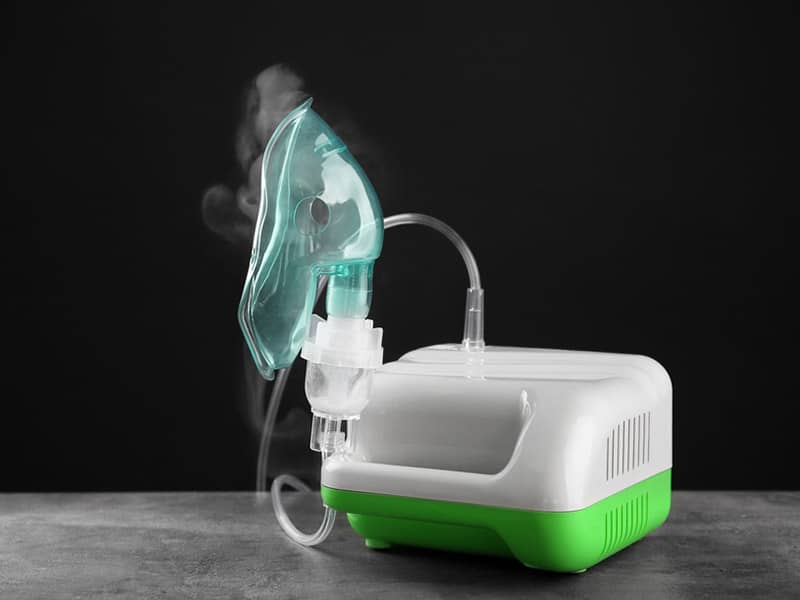Choosing the Best Nebulizer Medicines for Effective Respiratory Treatment
With many nebulizer medicines available, it’s imperative to grasp the options to select the most fitting one for your precise medical condition. This article will delve into the best nebulizer medicines commonly advised by healthcare professionals.
Budesonide
Budesonide, an inhaled corticosteroid (ICS), is pivotal in reducing airway inflammation. It is customarily recommended for long-term asthma management and other chronic respiratory conditions. When delivered through a nebulizer, budesonide aids in preventing asthma attacks by curbing airway inflammation and hypersensitivity.
Fluticasone
Fluticasone, another inhaled corticosteroid, is harnessed in a nebulizer form to control airway inflammation. It is typically suggested for patients coping with moderate to severe asthma. Fluticasone is a cornerstone of daily maintenance therapy, reducing the frequency and intensity of asthma symptoms.
Pulmozyme (Dornase Alfa)
Pulmozyme, or dornase alfa, finds its niche as a medication administered to individuals grappling with cystic fibrosis. This remarkable agent serves to thin out mucus and facilitate its quality in the airways, rendering it more manageable to expel. When dispensed via a nebulizer, pulmozyme aids in reducing lung infections and enhancing lung function among those contending with cystic fibrosis.
Tobramycin
Tobramycin, an antibiotic nebulizer solution, is designed to combat chronic respiratory infections, especially in individuals with cystic fibrosis. This antibiotic proves its mettle against an array of bacteria typically encountered in such patients’ lungs. Tobramycin is generally administered in cycles to manage and stave off infections effectively.
Cromolyn Sodium
Cromolyn sodium, a mast cell stabilizer, operates to prevent the release of chemicals responsible for airway inflammation. In nebulized form, this agent is instrumental in managing conditions such as exercise-induced bronchoconstriction and allergic asthma. It is often consumed before exposure to triggers that could exacerbate respiratory symptoms.
Racemic Epinephrine
Children with croup and other upper airway blockages are treated with racemic epinephrine. This medicine alleviates respiratory distress symptoms by constricting blood vessels and decreasing airway inflammation. Racemic epinephrine is usually administered via a nebulizer, which guarantees quick relief.
Beractant and Poractant Alpha
Beractant and poractant alpha, both surfactants, are enlisted to address respiratory distress syndrome (RDS) in premature infants. Surfactants enhance lung performance by reducing surface tension, making breathing easier for premature infants. These medications are a linchpin in the care of preterm infants grappling with underdeveloped lungs.
Choosing the Appropriate Nebulizer Medicine
The selection of the best nebulizer medicines is paramount for effective respiratory treatment. Here are several pivotal considerations:
- Healthcare Provider’s Prescription: Always adhere to the prescription and guidance furnished by your healthcare professional when selecting nebulizer medicines. Your specific medical condition and needs shape these guidelines.
- Severity of the Condition: The gravity of your respiratory condition wields a decisive influence over the choice of medication. Short-acting bronchodilators like albuterol are typically preferred for acute symptoms, whereas chronic conditions may necessitate long-term control with inhaled corticosteroids.
- Age and Patient Specifics: Factor in the patient’s age and any distinct requirements. Particular medications, such as racemic epinephrine, are suitable for children, while others are tailored to adults.
- Potential Side Effects: Be vigilant about possible side effects of nebulizer medicines. Address any concerns with your healthcare provider, and monitor your response to the medication.
- Compliance and Convenience: Set your sights on nebulizer medicines that align with your way of life and are easy to use. Some medications require daily upkeep, while others are designed for as-needed consumption.
- Safety Precautions: Always adhere to safety guidelines for nebulizer usage, encompassing meticulous cleaning and maintenance to avert contamination.
Conclusion
The best nebulizer medicines are pivotal players in managing respiratory conditions, ushering in relief from symptoms, and enhancing overall well-being. The selection of the correct medication should be rooted in the guidance of a healthcare professional, the specific respiratory condition, and the distinct requirements of the patient. When wielded judiciously, nebulizer medicines constitute potent instruments that can significantly augment the quality of life for those battling respiratory issues. It is of the essence to invariably consult with a healthcare provider for personalized advice and insights into the best nebulizer medicine for your condition.
















